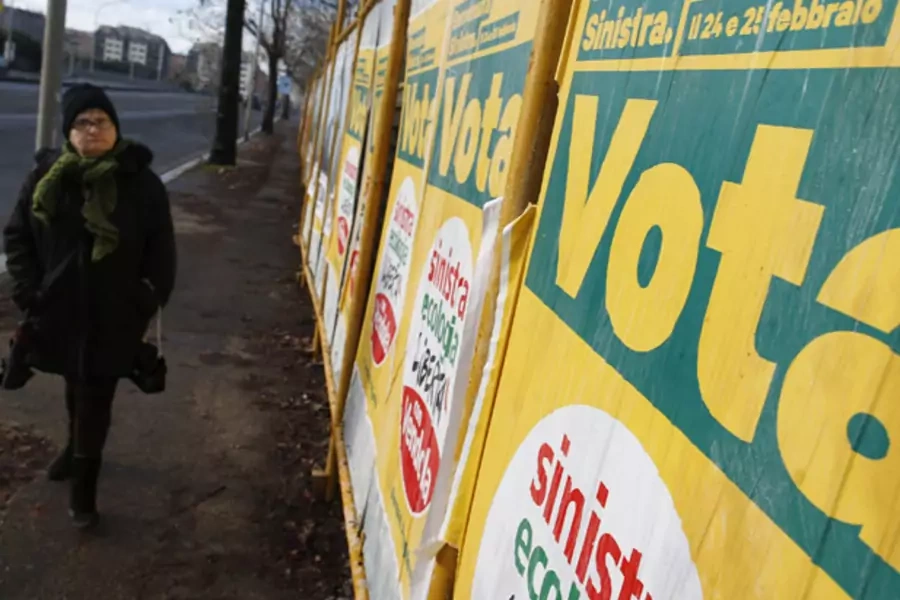The World Next Week: Italy Votes, NATO Defense Ministers Meet, and the UN Security Council Discusses North Korea

More on:
The World Next Week podcast is up. Bob McMahon and I discussed Italy’s upcoming elections, the NATO defense ministers’ meeting in Brussels, and the UN Security Council discussion on North Korea.
[audio: http://www.cfr.org/content/publications/media/editorial/2013/20130214_T…]
The highlights:
- Italians go to the polls next weekend to elect a new Chamber of Deputies (lower chamber) and a new Senate (upper chamber). The center-left Democratic Party (DP) currently leads in the polls, but no one expects it to win enough votes to govern on its own. That means that the DP would need to assemble a coalition government, most likely in collaboration with the centrist coalition led by current Italian prime minister Mario Monti. But the political situation in Italy is fluid. The DP has been losing steam in recent weeks, in part because of its association with an Italian bank mired in a scandal. The center-right coalition headed by former Italian prime minister Silvio Berlusconi has gained momentum as the DP has faltered. Another beneficiary has been the Five Star Movement, a populist party founded by a popular Italian comedian. Italians are going to the polls with unemployment at 11.2 percent, the highest it has been in thirteen years, and an economy that looks poised to shrink by one percent over the next year.
- NATO defense ministers meet in Brussels next week. The topics likely to pop up during the discussion include Afghanistan, Mali, and defense spending. But the big topic looming in the background will be NATO’s future. Afghanistan sapped the political support in many NATO member countries for “out-of-area” operations, Libya exposed the deficiencies of many European militaries, and the eurozone crisis increased the political and economic pressures in Europe to slash defense spending. A “global NATO” certainly doesn’t look to be in the offing. Indeed, the organization, which has been the backbone of Western security for more than six decades, will do well just to hold its own over the next decade given the headwinds its faces.
- The UN Security Council meets next Thursday to discuss sanctions on North Korea. Last month the Security Council threatened Pyongyang with “significant action” if it went through with another nuclear test. The North Koreans weren’t listening. On Tuesday they conducted their third nuclear test. Governments around world have condemned it as a grave threat to world peace. Even China, Korea’s only ally, wagged its finger. But that doesn’t mean that Beijing is ready to force Pyongyang to abandon its nuclear ambitions. And the Security Council will not be able to do much of anything significant without active Chinese cooperation.
- Bob’s Figure of the Week is Pope Benedict XVI. My Figure of the Week is 1,000. As always, you’ll have to listen to the podcast to find out why.
For more on the topics we discussed in the podcast check out:
Italy votes for parliament: The BBC provides a Q&A on the Italian elections. The New York Times writes about the different candidates and how Berlusconi is gaining in the polls. The Wall Street Journal predicts what will happen if no one can form a government after the elections and the possible implications for the Italian economy.
NATO defense ministers meet: NATO provides information on the current ministers of defense of NATO countries. Reuters writes how France’s intervention in Mali revealed gaps in European defense and on the transfer of command in Afghanistan to General Joseph Dunford. The Huffington Post reports that the Afghan government welcomes the continued drawdown of NATO forces.
The UN Security Council discusses North Korea: The Security Council Report gives its forecast for February and its expectations for how the Security Council will deal with North Korea. CNN reports the details of North Korea’s most recent nuclear test. The New York Times reports on China’s response to the nuclear test.
More on:
 Online Store
Online Store
